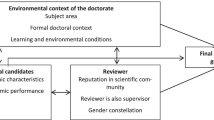Abstract
In this chapter, the authors analyze various factors influencing students’ choice of higher education institutions in Germany. Private universities offer small classes and strong alumni networks to compete with state universities. Using a cross-sectional analysis, the selection and evaluation criteria of students in both state and private universities are compared in terms of ranked importance. The results reveal that perceived employability is rated as more important for private universities than for state universities. Similarly, academic reputation and company connections are rated as more important for private universities than for state universities. These results are not surprising because students at private universities normally expect a reasonable return on their investment by paying higher tuition fees.
Access this chapter
Tax calculation will be finalised at checkout
Purchases are for personal use only
Similar content being viewed by others
References
Angell, R. J., Heffernan, T. W., & Megicks, P. (2008). Service quality in postgraduate education. Quality Assurance in Education, 16(3), 236–254.
Bock, K. H. (1991). Studium- und Berufswahl, 1991/92. Bad Honnef: Entscheidungshilfen für Abiturienten und Absolventen der Fachoberschulen.
Chapleo, C. (2011). Branding a university: Adding real value or smoke and mirrors? In M. Molesworth, R. Scullion, & E. Nixon (Eds.), The marketisation of higher education and the student as consumer (pp. 101–114). London: Routledge.
Destatis Statitistisches Bundesamt. (2013). Bildung und Kultur-Private Hochschulen. Accessed 10, 2014, from https://www.destatis.de/DE/Publikationen/Thematisch/BildungForschungKultur/Hochschulen/PrivateHochschulen5213105137004.pdf?__blob=publicationFile
DHBW. (2014). Benefits of the dual studies. Accessed 1, 2014, from http://www.dhbw-stuttgart.de/service/english/benefits-of-the-dual-studies.html
Elliot, K. M., & Healy, M. A. (2001). Key factors influencing student satisfaction related to recruitment and retention. Journal of Marketing for Higher Education, 10, 1–11.
Frank, A., Hieronimus, S., Killius, N., & Meyer-Guckel, V. (2010). Rolle und Zukunft privater Hochschulen in Deutschland. Essen: Stifterverband für die Deutsche Wissenschaft.
Frølich, N., & Stensaker, B. (2010). Student recruitment strategies in higher education: Promoting excellence and diversity? International Journal of Educational Management, 24(4), 359–370.
Gate Germany. (2010). Internationales Hochschulmarketing an deutschen Hochschulen-Ergebnisse einer bundesweiten Umfrage. Bielefeld: Bertelsmann Verlag.
Grönroos, C., & Ojasalo, K. (2007). Service management and marketing. Customer management in service competition (3rd ed.). West Sussex: Wiley.
Hachmeister, C. D., Harde, M. E., & Lange, M. F. (2007). Einflussfaktoren der Studienentscheidung. Eine empirische Studie von CHE und EINSTIEG. Centrum für Hochschulentwicklung gGmbH (Working Paper No. 95). http://www.che-concept.de/downloads/Einfluss_auf_Studienentscheidung_AP95.pdf.
Heine, C., Spangenberg, H., Sommer, D. (2005). Studienberechtigte 2004, Erste Schritte in Studium und Berufsausbildung, Vorauswertung der Befragung der Studienberechtigten 2004 ein halbes Jahr nach Schulabgang im Zeitvergleich (Vol. A 10/2005). Hannover.
Lower Saxon Ministry of Science and Culture. (2014). Wissenschaftsministerium fördert den Studienerfolg. Accessed 10, 2014, from http://www.mwk.niedersachsen.de/portal/live.php?navigation_id=6257&article_id=126918&_psmand=19
Marquardt, J., & Wiesmeth, H. (2013). Managing and positioning of a private business school in germany. In A. Altmann & B. Ebersberger (Eds.), Universities in change. Innovation, technology, and knowledge management (pp. 155–170). Berlin: Springer.
Meffert, H., & Müller-Böling, D. (2007). Hochschulmarketing—Herausforderung und Erfolgsfaktoren im Wettbewerb (Arbeitspapier Nr. 98). Dokumentation der Tagung vom 15.01.2007.
Münch, R. (2013). The Bologna process in the German system of higher education. From occupational monopolies to the global struggle for educational prestige. European Political Science, 12, 424–431.
Naidoo, V., & Wu, T. (2011). Marketing strategy implementation in higher education: A mixed approach for model development and testing. Journal of Marketing Management, 27(11–12), 1117–1141.
Obermeit, K. (2012). Students choice of universities in Germany: Structure, factors and information sources used. Journal of Marketing for Higher Education, 22(2), 206–230.
Osel, J. (2012). Studienbeiträge sind eine soziale Maßnahme. Accessed 3, 2013, from http://www.sueddeutsche.de/bayern/heubisch-im-sz-interview-studienbeitraege-sind-sogar-eine-soziale-massnahme-1.1524638
Reckenfelderbäumer, M., & Kim, S. (2006). Hochschulmarketing 2010-Aktuelle Heraus-forderungen und Marketingansätze für deutsche Hochschulen. In R. Voss (Ed.), Hochschulmarketing, 2. Aufl: Köln.
Soutar, G. F., & Turner, J. P. (2002). Students’ preferences for university: A conjoint analysis. International Journal of Educational Management, 16(1), 40–45.
Sultan, P., & Wong, H. Y. (2013). Antecedents and consequences of service quality in a higher education context: A qualitative research approach. Quality Assurance in Education, 21(1), 70–95.
Statistisches Bundesamt. (2015). Anteil ausländischer Studierender an deutschen Hochschulen vom Wintersemester 1998/99 bis 2013/14. Accessed 3, 2015, from http://de.statista.com/statistik/daten/studie/222/umfrage/anteil-auslaendischer-studenten-an-hochschulen/
Stifterverband. (2010). Rolle und Zukunft privater Hochschulen in Deutschland. Essen: Verwaltungsgesellschaft für Wissenschaftspflege mbH.
Tutt, L. (1997). Der Studienentscheidungsprozess: Informationsquellen, Informationswünsche und Auswahlkriterien bei der Hochschule. Duisburg: Fachbereich Wirtschaftswissenschaften der Gerhard-Mercator Universität.
Ulrich, G., & Voss, R. (2010). Hochschul relationship marketing. Lohmar-Köln: Josef EUL Verlag GmbH.
Voss, R. (2004). Lehrqualität und Lehrqualitätsmanagement an öffentlichen Hochschulen-Problematik, Konzepte und Empfehlungen für die Gestaltung derLehre. Hamburg: Kovac.
Author information
Authors and Affiliations
Editor information
Editors and Affiliations
Copyright information
© 2016 The Author(s)
About this chapter
Cite this chapter
Platz, S., Holtbrügge, D. (2016). Student Expectations and Experiences in Higher Education: A Comparison of State and Private Universities in Germany. In: Wu, T., Naidoo, V. (eds) International Marketing of Higher Education. Palgrave Macmillan, New York. https://doi.org/10.1057/978-1-137-54291-5_8
Download citation
DOI: https://doi.org/10.1057/978-1-137-54291-5_8
Published:
Publisher Name: Palgrave Macmillan, New York
Print ISBN: 978-1-137-54290-8
Online ISBN: 978-1-137-54291-5
eBook Packages: EducationEducation (R0)




